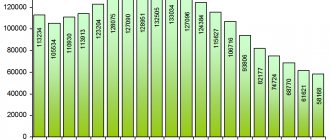The state considers caring for children the duty of any parent. Quite often this commandment is violated. Children are subjected to domestic violence, left without proper supervision, and involved in drinking alcohol. But improper performance of parental responsibilities towards children entails legal liability. It is established by current legislation and contains sanctions provided for in various branches of law: family law, administrative, civil, criminal.
Rights and responsibilities of parents
The Constitution of the Russian Federation declares and interprets the upbringing of children as a set of rights and responsibilities of a citizen. Father and mother are equally responsible for providing the child with everything necessary for a decent life and comprehensive development. Since one of the goals of the state is to educate literate and law-abiding citizens, it provides parents with the rights to protect the legitimate interests of their children in all instances, including the courts.
At the same time, the state imposes responsibility on citizens for the exercise of parental rights. This means that both parents must promptly satisfy the child’s needs for food, clothing, toys, medicines, provide their offspring with the opportunity to study in accordance with the level of development, reveal creative abilities and have proper rest.
The main responsibilities of parents are spelled out in . Among them:
- upbringing;
- spiritual, moral, mental development of children;
- satisfaction of physiological needs in a timely manner and in full;
- creating optimal living conditions;
- taking into account the opinion of a child over 10 years old regarding the educational system applied to him;
- protection of the interests of minors;
- taking responsibility for the actions of children.
Regardless of the presence (absence) of parental rights, the mother and father are obliged to allocate funds for the maintenance of the child voluntarily or compulsorily.
Parents have the right to independently choose how to raise their sons and daughters, what incentives and punishments to use. The Family Code sets the only limitation: actions towards a child should not cause moral or physical harm to him, or lead to a violation of the rights of a minor. Otherwise, administrative or criminal liability may arise.
Signs of improper performance of duties
Parental neglect of their responsibilities can be expressed as follows:
- the child living in unsanitary conditions;
- the minor lacks necessary personal belongings, textbooks, toys;
- neglect in the evening and at night;
- causing obstacles to obtaining education or proper medical care (including for religious reasons);
- lack of care and attention, the result of which was the infliction of moral or physical harm on a minor;
- cruel treatment.
The presence of one of the above factors indicates that not all is well in the family. If several signs of failure by parents to fulfill their duties are identified, then supervisory authorities are obliged to immediately take adequate measures to protect the interests of the minor.
Criminal liability
Article 156 of the Criminal Code of the Russian Federation contains a list of measures of influence applied to parents, as well as persons responsible for minors. They are used in cases of poor performance by citizens of their upbringing responsibilities in combination with child abuse. Abuse means:
- physical violence - torture, beatings;
- psychological pressure - mockery, humiliation of human dignity, demonstration of hostility;
- restrictions on freedom of movement;
- presenting impossible demands to the child;
- causing serious harm to his loved ones in front of a child.
Such actions are punishable by a large fine (up to 100 thousand rubles), the collection of an annual wage, or two years of correctional labor. Officials who have committed the crimes listed above are deprived of the right to conduct activities related to raising children for a period of up to five years. The maximum penalty under this article is three years' imprisonment.
The punishment is chosen by the court taking into account the severity of the offense committed by the parent and the presence of mitigating or aggravating circumstances. In any case, a citizen who committed the above actions in relation to a child will be punished and lose parental rights for some period of time.
Article 157 of the Criminal Code of the Russian Federation declares liability for malicious evasion of alimony payments. It means the parent’s deliberate concealment of his whereabouts, concealment of income, and deliberate parasitism. Such an act is punishable by forced labor or correctional labor for up to one year. The maximum possible punishment for a parent-deviator is imprisonment for a similar period. Moreover, serving the sentence does not relieve the offender from the obligation to pay alimony in full.
Responsibility of parents for non-fulfillment or improper fulfillment of parental responsibilities
The Constitution of the Russian Federation establishes that caring for children and raising them is an equal right and responsibility of parents (Part 2 of Article 38 of the Constitution of the Russian Federation).
In accordance with Art. 63 of the Family Code of the Russian Federation, parents have the right and obligation to raise their children. All these responsibilities are enshrined in Articles 64 and 65 of the Family Code of the Russian Federation.
Responsibility for the upbringing and development of children is common and binding for both parents, no matter where they are. Temporary transfer by parents of their children to relatives, strangers, or to one of the child care institutions does not relieve parents of responsibility for the upbringing and development of children. Parents and persons replacing them bear responsibilities for raising children until the child reaches adulthood.
What parental responsibilities are provided for by federal law?
The current legislation of the Russian Federation provides for various types of liability for failure to fulfill or improper fulfillment of one’s duties in raising children.
Criminal liability
Article 156 of the Criminal Code of the Russian Federation provides for criminal liability for failure to fulfill or improper fulfillment of duties for the upbringing of a minor by a parent or other person entrusted with these duties, as well as by a teacher or other employee of an educational, training, medical or other institution obliged to supervise a minor, if this the act is connected with cruel treatment of a minor.
Article 157 of the Criminal Code of the Russian Federation provides for criminal liability for malicious evasion of a parent from paying alimony: “Malicious evasion of a parent from paying, by a court decision, funds for the maintenance of minor children, as well as disabled children who have reached the age of eighteen” is punishable by correctional labor for up to one year, or forced labor for the same period, or arrest for a term of up to three months, or imprisonment for a term of up to one year.
Civil liability
For failure to fulfill or improper fulfillment of responsibilities for raising children, parents can also be brought to civil liability.
The possibility of recovering compensation in favor of a child for causing moral or property damage to him is not directly provided for by family law, but follows from the provisions of Art. 151, 1064, 1099 Civil Code of the Russian Federation. A parent who has committed violations of his duties, has not fulfilled his obligations to provide the child with food and clothing, which resulted in harm to the child’s health, may be brought to civil liability in the form of compensation for moral damage and damages.
Responsibility provided for by the Family Code of the Russian Federation
In accordance with Art. 69 of the Family Code of the Russian Federation, parents (one of them) may be deprived of parental rights if they:
- evading the duties of parents, including malicious evasion of alimony payments;
- refuse, without good reason, to take their child from a maternity hospital (ward) or from another medical institution, educational institution, social welfare institution or similar organizations;
- abuse their parental rights;
- children are cruelly treated, including physical or mental violence against them, and attacks on their sexual integrity;
— are patients with chronic alcoholism or drug addiction;
- committed a deliberate crime against the life or health of their children or against the life or health of their spouse.
Administrative and legal responsibility
The offense provided for in Article 5.35 of the Code of Administrative Offenses of the RPF “Failure of parents or other legal representatives of minors to fulfill their duties for the maintenance and upbringing of minors” consists of the inaction of parents or other legal representatives of minors, i.e. when they deliberately do not fulfill their responsibilities for raising and educating children: they do not care about the moral education, physical development of children and strengthening their health, creating the necessary conditions for their timely receipt of education, successful training, etc.
Failure by parents to fulfill their obligations to raise and educate minor children is understood as a systematic pattern of illegal actions (inaction) carried out over a long period of time; This offense is a continuing administrative offense.
The lack of parental care, a normal microclimate in the family, the failure of parents to provide adequate material support to children, the lack of control over their behavior can serve as the basis for a teenager to commit an antisocial act. Administrative liability of parents and persons replacing them under this article has an independent basis and occurs not for the commission of offenses by teenagers, but in connection with them.
Federal Law of December 29, 2010 No. 436-03 “On the protection of children from information harmful to their health and development”
In the presence of parents or other legal representatives of children who have reached the age of six years, the circulation of the following information products containing justified by its genre and (or) plot is allowed:
- episodic depiction or description of cruelty and (or) violence (except for sexual violence) without a naturalistic depiction of the process of taking life or causing injury, provided that compassion for the victim and (or) a negative, condemning attitude towards cruelty, violence (except for violence) is expressed applied in cases of protection of the rights of citizens and legally protected interests of society or the state);
- an image or description that does not encourage the commission of antisocial actions (including the consumption of alcohol and alcohol-containing products, beer and drinks made on its basis, participation in gambling, vagrancy or begging), occasional mention (without demonstration) narcotic drugs, psychotropic and (or) intoxicating substances, tobacco products, provided that the admissibility of antisocial actions is not substantiated or justified, a negative, condemning attitude towards them is expressed and an indication of the danger of consuming these products, means, substances, products is contained;
- episodic non-naturalistic depictions or descriptions of sexual relations between a man and a woman that do not exploit interest in sex and are not of an exciting or offensive nature, with the exception of depictions or descriptions of actions of a sexual nature (Part 5 of Article 11, Article 9).
Law of the Sverdlovsk Region dated June 14, 2005 M 52-03 “On administrative offenses on the territory of the Sverdlovsk Region”
Article 5-2. Failure to fulfill the obligation to prevent children under the age of 16 from being in public places at night without being accompanied by parents (persons in their place) or persons carrying out activities with the participation of children.
Failure to fulfill the obligation to prevent children under the age of 16 from being in public places at night without the accompaniment of parents (persons replacing them) or persons carrying out activities with the participation of children shall entail the imposition of an administrative fine on officials in the amount of five thousand to ten thousand rubles; for legal entities - from twenty thousand to forty thousand rubles.
Article 5-3. Failure to comply with requirements to ensure measures to promote children's development and prevent harm to them.
Failure to comply with the requirements established by regulatory legal acts of the Sverdlovsk region for the provision by parents (persons replacing them) of measures to promote the physical, intellectual, mental, spiritual and moral development of children and to prevent harm to them shall entail the imposition of an administrative fine on citizens in the amount of one thousand to five thousand rubles
Law of the Sverdlovsk Region dated July 16, 2009 M 73-03 “On the establishment in the territory of the Sverdlovsk Region of measures to prevent children from being in places where being in which can cause harm to the health of children, their physical, intellectual, mental, spiritual and moral development, and to prevent children from being in public places at night without the accompaniment of parents (persons replacing them) or persons carrying out activities with the participation of children"
Article 4 establishes that the procedure for determining places in which presence may cause harm to the health of children, their physical, intellectual, mental, spiritual and moral development, and public places in which children are not allowed to be at night unaccompanied by their parents (persons substitutes), as well as persons carrying out activities with the participation of children, are determined by the Government of the Sverdlovsk Region.
Article 5 regulates the procedure for notifying parents (persons replacing them) or persons carrying out activities with the participation of children in the event of detection of children in places where being in which may cause harm to the health of children, their physical, intellectual, mental, spiritual and moral development , and at night in public places without the accompaniment of parents (persons replacing them), as well as persons carrying out activities with the participation of children.
In the event of detection of children in such places, internal affairs bodies notify parents (persons replacing them) or persons carrying out activities with the participation of children in the manner prescribed by federal legislation.
A list of places where being present can cause harm to the health of children, their physical, intellectual, mental, spiritual and moral development, and public places in which children are not allowed to be at night unaccompanied by their parents (persons in their place) or carrying out activities involving children
1. In order to prevent harm to the health of children, their physical, intellectual, mental, spiritual and moral development in the territory of the Sverdlovsk region, it is not allowed for persons under the age of 18 to be present at the facilities (territories, premises) of legal entities or citizens, carrying out entrepreneurial activities without forming a legal entity:
— which are intended for the sale of goods of a sexual nature only;
— which are intended for the sale of only alcoholic beverages, beer and drinks made on its basis;
- who have access to the Internet, as well as for the sale of services in the field of trade and public catering (organizations or points), for entertainment, leisure, where, in accordance with the procedure established by law, the retail sale of alcoholic beverages, beer and drinks made on its basis is provided.
2. In order to prevent harm to the health of children, their physical, intellectual, mental, spiritual and moral development in the territory of the Sverdlovsk region, it is not allowed for persons under the age of 16 to be present at night without the accompaniment of their parents (persons replacing them), or persons carrying out activities for education, upbringing, development, health protection, social protection and social services for children, promoting their social adaptation, social rehabilitation and similar activities with the participation of children (hereinafter referred to as persons carrying out activities with the participation of children):
- on the streets;
- at stadiums;
- in parks;
- in public gardens;
— in common areas of residential buildings;
— in public vehicles, the routes of which pass through the territory of the Sverdlovsk region;
- at facilities (territories, premises) of legal entities or citizens carrying out business activities without forming a legal entity, which are intended to provide access to the Internet.
Who, besides parents, can be held administratively liable?
The law equates other persons with parents. These are adoptive parents, guardians and trustees, both individuals and officials of guardianship and trusteeship authorities, public education institutions performing the functions of a state guardian.
Adoptive parents are also obliged to properly fulfill the responsibilities assigned to them: support, raise, educate, protect the rights and interests of their minor children.
A court may hold a parent deprived of parental rights liable for harm caused by his minor child within three years after the parent is deprived of parental rights, if the child’s behavior leading to the harm was the result of improper performance of parental responsibilities.
Who can draw up and review protocols on the administrative responsibility of parents?
Protocols on administrative offenses under Article 5.35 of the Code of Administrative Offenses of the Russian Federation are drawn up by officials of internal affairs bodies (police), as well as members of commissions on the affairs of minors and the protection of their rights.
Cases of administrative offenses are considered by the commission for the affairs of minors and the protection of their rights at the place of residence of the person in respect of whom proceedings are being conducted on the case of an administrative offense.
Administrative responsibility
The mistakes of parents, expressed in the improper upbringing of their children, neglect of their physical, spiritual and mental development, are essentially a form of inaction. In order for inaction to be recognized as an administrative offense, it is necessary to prove its systematic nature. In other words, only those parents who have avoided raising their offspring for a long time will be subject to administrative sanctions. For example, if a child does not attend an educational institution for a long time, the parents know about this and do not take measures to correct the situation, we can talk about their deliberate inaction.
Inaction in the interpretation of the Code of Administrative Offenses of the Russian Federation is a passive failure to fulfill parental responsibilities, entailing corresponding negative consequences for the minor. For such an act there is a punishment adequate to the gravity of the offense. As a measure of influence on irresponsible parents, the law provides for an administrative fine:
- for improper performance of duties – 100-500 rubles;
- for deprivation of the opportunity to communicate with immediate relatives, failure to comply with a court decision regarding the place of residence of a minor, obstruction of the performance of parental responsibilities - 2000-3000 rubles;
- repetition of the above violations – 4000-5000 rubles. or administrative arrest for 5 days.
In addition to parents, adoptive parents, trustees, as well as representatives of state authorities who perform the functions of a state guardian in relation to minors can be held civilly liable.
Parents can avoid administrative liability if they prove that at the time of the commission of the offense the child was under the control of another authorized person, for example, a school teacher, a children's camp counselor, a doctor at a district hospital, etc. In this case, officials of the relevant organization will bear responsibility for the unlawful actions of the minor.
Who else besides parents can be held responsible?
Persons who replace parents (temporarily or permanently) may also be held liable. In other words, this may affect adoptive parents, trustees and guardians, who can be both individuals and government institutions.
In addition to the above persons, a parent who has already been deprived of his parental rights may also be held accountable. Provided that his minor child caused harm to someone or something due to poor upbringing. A judge can do this within three years from the date of deprivation of these rights.
Civil responsibility
Improper performance of parental responsibilities is fraught with civil liability for negligent fathers and mothers. At the moment, Russian legislation does not contain direct indications that monetary compensation can be recovered from parents in favor of the child, but this directly follows from,.
According to their provisions, damage caused to the person of a minor or his property must be compensated in full. At the same time, compensation for property damage does not relieve the perpetrator from the need to compensate for moral damage.
If parents (guardians) did not provide the child with everything necessary and did not raise him, which resulted in moral or physical harm, compensation may be recovered from them in favor of the minor.
Arbitrage practice
There is a wealth of judicial practice on issues of citizens’ failure to fulfill their obligations to raise children. So, for example, the Pervomaisky District Court of Saratov received a claim from M. to deprive Z. of parental rights in relation to a young child. The plaintiff, in support of her claim, said that the marital ties between her and the defendant had long been completely interrupted, the husband did not fulfill his duties in supporting the minor, and was not involved in his upbringing. The defendant drinks alcohol in front of the child, provokes conflicts, and shows aggression towards the plaintiff. In this regard, she asks to deprive Z. of parental rights.
Defendant Z. did not agree with the claims at the meeting. He explained that he did not want to shy away from raising the child, he wanted to preserve his rights and take care of the baby in the future. The plaintiff and the defendant are in a tense relationship, so he does not deny that he sometimes drank in conflict situations in order to calm down. Currently, he has found a new job, is going to lead a sober lifestyle, and reconcile with the plaintiff.
The court, after hearing the plaintiff, came to the following conclusion: Article 69 of the Family Code includes a provision that one or both spouses may be deprived of parental rights if they: do not fulfill their duties, avoid paying alimony, or are chronic alcoholics.
Assessing the evidence collected in the case, the court believes that there could have been cases of failure on the part of Z. to fulfill his duties, but at the time of the consideration of the case they were not of a regular nature and occurred over a short period of time. The court is convinced that there are no sufficient reasons to satisfy the stated claims. In the interests of the child, the court considers that the deprivation of the defendant's parental rights seems unfounded and premature. Based on the above, the court decided to dismiss M.’s claim against Z..
Consequently, parents have great responsibility for raising and providing for their children. Violations of children's rights are punishable by law, as provided for in articles of the Family, Administrative, Civil and Criminal Codes.
Family legal responsibility
Deprivation of parental rights is the most severe measure against parents who do not fulfill their responsibilities towards their children. As a result of the application of such sanctions, citizens lose their rights to raise minors, the opportunity to regularly see them and exercise other parental functions. However, they continue to fulfill responsibilities for the material maintenance of children.
Deprivation of parental rights is carried out on the following grounds:
- malicious evasion of alimony payments;
- refusal to pick up a child from a maternity hospital, medical, rehabilitation, social or other institution;
- abuse of parental rights;
- chronic alcoholism, drug addiction;
- committing a deliberate crime against a child or his father (mother).
Law enforcement officials together with the commission on juvenile affairs are required to record the offense. For this purpose, a protocol is drawn up outlining the circumstances of the unlawful act. Cases of administrative offenses are considered at the place of residence of the guilty parent.
Read: What are the responsibilities of parents in raising and supporting children?
Corpus delicti
The elements that constitute the crime are:
- an object;
- objective side;
- subject;
- subjective side.
The object of this crime is the child himself, who has not reached the age of majority, as well as his moral, psychological, physical development and health.
The objective side is the failure to fulfill obligations to support and raise a child by parents, cruel treatment of a minor, or incomplete fulfillment of duties in an unacceptable form.
Failure to comply is considered the complete absence of parents in the child’s life, attention to the development, education and health of the baby. In such a case, liability may arise if the parent should have fulfilled the obligations and could have done so. Poor and substandard fulfillment of assigned obligations is considered improper.
For unconditional criminal liability to arise, it is necessary that non-fulfillment or improper fulfillment be accompanied by cruel treatment on the part of guardians and parents. In this case, no consequences are required to finally formulate the crime.
The subject of a crime is any adequate person who has reached the age of 16 .
Specifically, the subjects of the crime of violating the education of a minor are:
- the child's parents;
- guardian (if there are no parents and he has an obligation to care for the child);
- a teacher or educator in a special institution that is obliged to ensure the rights of minors.
The subjective side is the guilt of the subject for intentionally causing harm.







